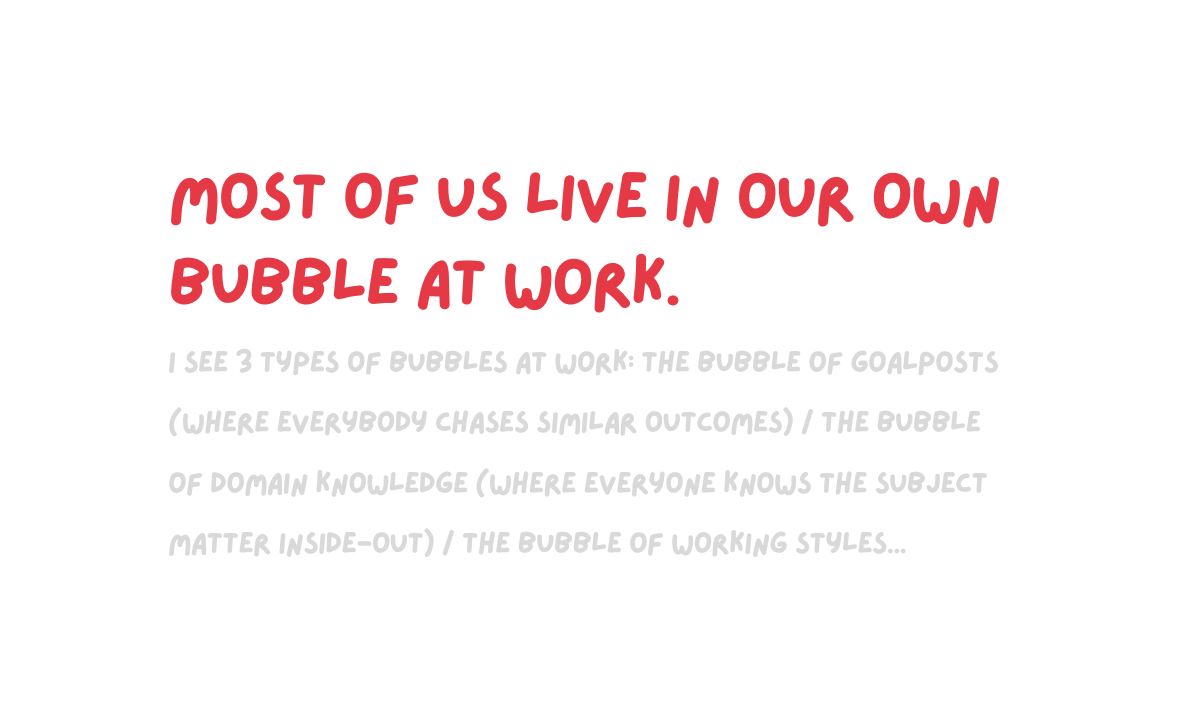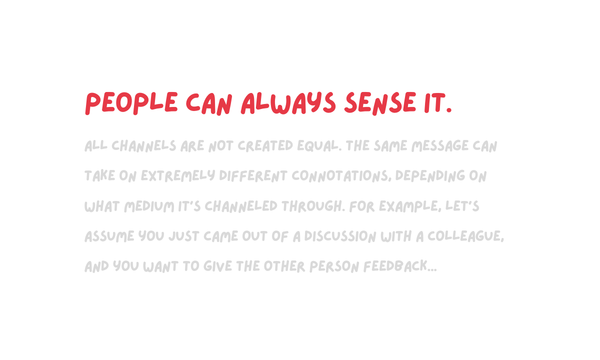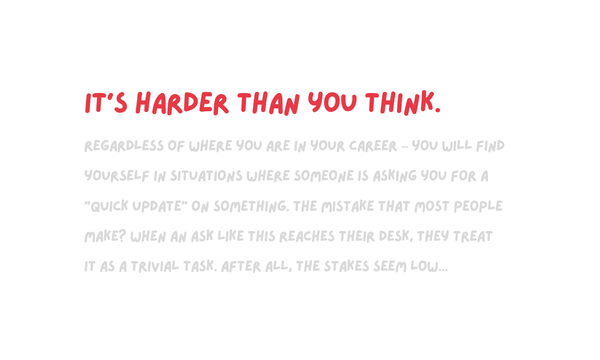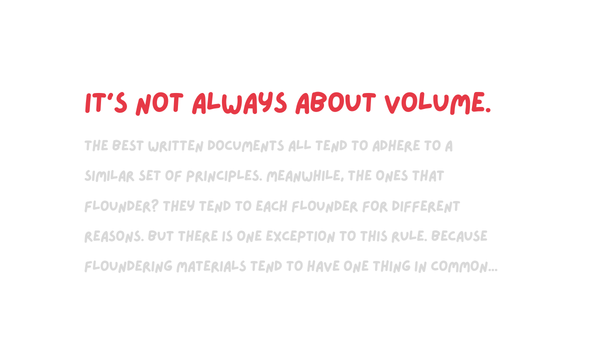The Art of "Bursting" Your Own Bubble
...on expanding your sphere of influence.

Most of us live in our own bubble at work.
I don't mean this in a bad way. It just means that we tend to work with people who think like us and operate like us. People simply get you – and you get them.
But stay too long in the bubble? You might find yourself gradually losing the ability to work with (and influence) people outside of your world.
And that's dangerous.
The 3 types of bubbles at work
I see 3 types of bubbles at work:
- The bubble of goalposts (where everybody chases similar outcomes)
- The bubble of domain knowledge (where everyone knows the subject matter inside-out)
- The bubble of working styles (where everybody operates in a similar manner)
Again, being in a bubble isn't inherently bad. But to solve hard problems at work? It almost always requires dealing with people outside of our bubbles and expanding our sphere of influence.
And that requires self-awareness – and the ability to adapt.
So let's talk about the dangers of these bubbles – and how to overcome them.
#1 The bubble of goalposts
Most people work in a bubble of goalposts. In other words, they're used to working with others who are also pursuing similar business outcomes.
This is fine. Except that when you leave your bubble? What you care about might be considered tactical or even irrelevant for some others.
For instance, consider the topic of driving sales growth for the business. At a glance, the goalposts would appear to be fairly straightforward for anyone (i.e. the more sales the better).
However, you'll find different people asking different questions. For instance:
- The data analyst: "What data is required to build the most insightful and most error-free sales dashboard? "
- The strategy manager: "What does our fair share look like in this market? How do we get there?"
- The junior account manager: "How do I hit my sales quota for this quarter?"
- The mid-level sales manager: "What does our sales pipeline look like for rest of the year? What resourcing do I need to advocate for to fulfill upcoming demand?"
- The senior sales executive: "What does our growth potential look like for the next 3 years? Do I have the right people to make it happen?"
I have seen brilliant analysts walk into a room and talk extensively about new dashboard features to sales managers – not realizing that the latter hardly cared. Yet I have also seen people do the same pitch and succeed.
The difference? They recognized that the sales managers didn't care about how "cool" the new features were. Instead, they recognized that the audience cared about two things:
- Does the dashboard properly reflect sellers' efforts (i.e. is the data accurate)?
- Does the dashboard help uncover new sales opportunities (e.g. can it provide insightful benchmarks)?
So they framed their spiel accordingly. And it made a huge difference.
When you actively "burst" your own bubble, you make it a reflex to always put yourself in others' shoes. Sure, you might be technically discussing the same subject – but you can be in pursuit of very different goalposts.
And the best operators recognize when goalposts differ.
👋 Subscribe for free to get Herng's newsletter directly in your inbox.
#2 The bubble of domain knowledge
The bubble of domain knowledge occurs when we spend too much time with people who share our expertise. And when we work with others outside of this bubble, we forget things like:
- Certain acronyms mean nothing to others
- Jargon is offputting, rather than illuminating
- Lack of historical context can lead to confusion
- Things that appear to be simple truths require justification
For example, imagine that you're a financial analyst trying to explain your role to an engineering co-worker.
Here's an example of being "stuck" in one's bubble:
My team focuses on analyzing SOW trends across our client portfolio. The goal is to ensure operational rigor and seller hygiene when it comes to CRM processes. For me personally, I focus on sizing upper-funnel budgets.
What's wrong with this spiel? I can name a few:
- Acronyms (SOW, CRM) that likely sound foreign to an engineer
- Jargon (e.g. "upper-funnel") that requires basic domain knowledge
- Phrases (e.g. "operational rigour," "seller hygiene") that aren't necessarily jargon, but have become shorthand with specific meaning only for people in the know
A better way of delivering this? We want to set context, cut down on jargon, and simplify. For instance, something like:
My team is focused on helping sales teams sell better. One of the ways in which we do this is by providing better sales intelligence, such as estimating potential revenue headroom for a given client. For me personally, I focus on analyzing a specific type of advertising budgets...
Sure, it can be mentally taxing – but the best communicators train themselves to do this as tablestakes.
(Related: they also know how to contextualize properly.)
It's the only way to make messages land.
👋 Subscribe for free to get Herng's newsletter directly in your inbox.
#3 The bubble of working styles
I switched teams at work once many years ago, going from a frontline-facing sales team to an internal strategy and operations team (related: read my take on what goes on exactly in the world of StratOps).
It was wonderful. I found myself surrounded by people who thought like me, wrote like me, and analyzed like me. I didn't know it at the time – but I had found my "bubble."
As I became more tenured and took on more responsibility, however, I started to work with a wider mix of stakeholders. And they all operated very differently.
For instance:
- Some stakeholders were highly analytical and data-driven; some less so
- Some stakeholders preferred doing everything face-to-face; some were the exact opposite
- Some stakeholders were fantastic at context-switching; some were much more allergic
Bursting the bubble of working styles means we recognize that not all competent people work the same way. And we cannot expect to only work with those who "get" us.
To operate effectively – we must adapt.
As an example: I once worked for a leader who was highly amiable and accessible, but had the unfortunate habit of going down certain rabbit holes during meetings. In fact, most meetings I would struggle to even make it past my opening slide.
This was obviously frustrating. Sure, he was the exception rather than the norm when it came to how my stakeholders tended to operate. But I still had to learn how to adapt.
So once I moved past the frustration stage? I made a few adjustments. For example:
- Structuring my materials so that my key messages were always upfront. I went into every meeting fully expecting to only get one slide's worth of attention – and I would craft my slide accordingly to suit that worst case scenario.
- Finding alternative ways to provide context. I realized that meetings were getting sidetracked because the leader rarely had time to digest the briefing materials. So I would find ways to bring him up to speed and ensure sufficient context before setting up any decision-making meetings.
Bursting our bubble of working styles = more work for us. But it allows us to take on so much more complexity at work.


